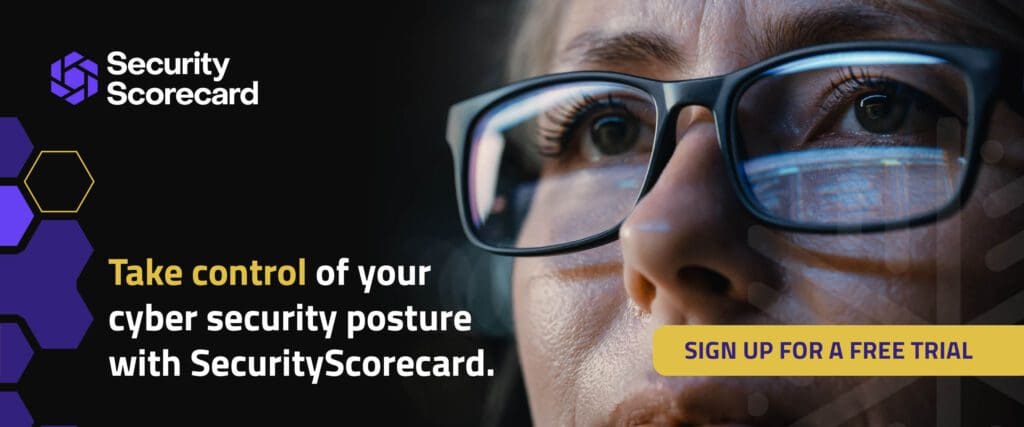Forrester Includes SecurityScorecard in Cybersecurity Risk Ratings (CRR) Landscape Report
Recent high-profile data breaches attributed to SolarWinds, Log4j, MOVEit, and more have demonstrated that the world still lacks a standard framework to measure cyber risk. Cybercriminals continue to exploit the trusted relationships between companies and their third-party suppliers and vendors, resulting in damaging attacks.
What’s more, a recent increase in ransomware attacks have led to a sharp uptick in cyber insurance claims, resulting in significant losses for cyber insurers and increased premiums. It’s clear that organizations can no longer rely on static analyses to provide a transparent look at their cybersecurity ecosystems.
Cybersecurity risk must be continuously assessed across the entire supply chain and vendor ecosystem. Organizations need quantitative metrics, which can be easily understood in the boardroom, to measure that dynamic risk in a standardized and actionable way. Cybersecurity ratings provide a level of accountability and transparency in the dark world of cybersecurity threats. But deciding on the right cybersecurity ratings platform can be daunting.
To help sift through the ever-growing field of cybersecurity ratings, Forrester recently published The Cybersecurity Risk Ratings Platforms Landscape, Q1 2024.1
SecurityScorecard is proud to be included in this landscape, in the company of other notable vendors in the field. Once a misunderstood technology, Cybersecurity Risk Ratings platforms (CRRs) have earned their place in the spotlight in the last several years.
CRR Defined
According to the report, Forrester defines a CRR as:
“A platform that collects, aggregates, attributes, and synthesizes various cybersecurity indicators from an entity’s externally observable digital footprint into a single, observable metric or score. These platforms use a consistent scoring methodology to create an overall, point-in-time rating of the entity’s current external cyber risk exposure and posture.”
Top CRR use cases
Enterprise buyers must understand the specific challenges these platforms can help them address. As identified by Forrester, the core use cases of CRR platforms are outlined in the chart below:

What’s next for CRR platforms
Looming cyber regulations from the Securities and Exchange Commission (SEC) and the European Union (DORA) are generating demand for stronger security oversight. Against this backdrop, security ratings are well positioned to provide insights to organizations who need more sophisticated monitoring.
In addition to the regulatory aspect, CRR vendors are increasingly becoming an attractive partner for cyber insurance providers. Security ratings are critical factors relied upon by the cyber insurance industry in assessing cyber risk. Cybersecurity ratings offer insurance companies the capability to accurately and rapidly provide quotes and manage their risk exposure, while offering customers the opportunity to manage and improve their security posture.
For a decade, SecurityScorecard has been committed to providing free security ratings for all organizations, and we firmly believe that security ratings are a fundamental right necessary to safeguard society and the economy. Today, SecurityScorecard ratings are used by:
- 70% of the Fortune 1000
- 9 of the 10 top banking institutions
- 8 of the 10 largest insurance companies
The security industry has grown up in the last several years, and SecurityScorecard’s innovations advance the industry’s most transparent, trusted, and accurate security ratings.
Collaboration: Our path to a safer digital world
Forrester correctly points out that CRRs should not be considered a substitute for all security technologies. SecurityScorecard wholeheartedly agrees; the industry is still evolving, but ratings are an important start because they are a universal and easy-to-understand measurement for cybersecurity.
The move towards metrics, regulations, and securing the supply chain all point to a future with greater cyber resilience. One where all stakeholders will benefit by improving their individual cybersecurity health for the sake of the greater good. With a more transparent and measurable view of cyber risk, the world can move toward a more sustainable and resilient future.
Whether it’s augmenting third-party risk management (TPRM) programs; continually monitoring an organization’s external attack surface; or providing easy-to-understand scores to nontechnical audiences, SecurityScorecard is on a mission to make the world a safer place. By enhancing cybersecurity trust and transparency, we believe that ratings provide a transparent and consumable way to understand cyber risk and quantify trust.
Learn more about Cybersecurity Risk Ratings and why we believe SecurityScorecard can help your organization.
Read The Cybersecurity Risk Ratings Platforms Landscape, Q1 2024





